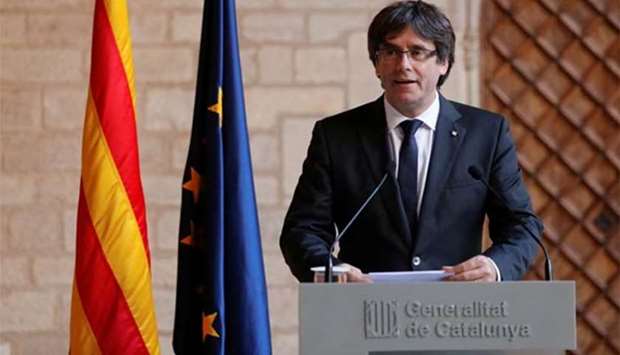Catalonia's leader Carles Puigdemont said on Thursday he had considered calling elections in an effort to ease the separatist crisis as Madrid prepares to seize control of the region, but decided there were no "guarantees" to do so.
In a televised statement, he said it was now "up to the (regional) parliament," which is expected to meet later on Thursday, to decide on how to respond to the central government's planned takeover of Catalan political powers following an outlawed independence referendum.Earlier, thousands of Catalans marched for independence as the region's separatist leader came under fire from allies amid speculation he will back down from threats to break away from Spain.
Even before any announcement, two Puigdemont-allied MPs resigned in protest, and others objected vehemently.
Spain's Ibex 35 of leading shares, however, soared more than two percent on the reports.
"I don't agree with the decision to go to elections. I resign as MP and I will leave the @Pdemocratacat," tweeted Jordi Cuminal of Puigdemont's PDeCat party.
Thousands of pro-independence students and activists gathered in front of the regional government in Barcelona, chanting: "independence." One banner read: "Puigdemont, traitor."
Regional lawmakers are scheduled to meet later in a session many had feared would lead to a unilateral declaration to break Catalonia away from Spain.
At the same time, a Senate committee is scheduled to gather in the Spanish capital to work on a blueprint for seizing the region's political powers and finances in a bid to stop the independence drive.
The upper house, where Prime Minister Mariano Rajoy's Popular Party (PP) holds a majority, is due Friday to approve the measures under Article 155 of the constitution, a never-before-used provision designed to rein in rebel regions.
The measures would see Madrid taking control of Catalonia's government, police, purse and public broadcaster, until new elections are held.
Catalonia is one of 17 regions, with varying degrees of autonomy, that make up Spain.
It was not clear on Thursday whether the central government would back off if Puigdemont does abandon his independence drive and calls early elections.
As the pressure built, there have been moves to mediate between the regional and central executives, a source close to the efforts told AFP. Mediators included politicians and government officials from different backgrounds.
Margarita Robles of the Socialist Party, which has backed Spain's ruling conservative PP party in its moves against the Catalan independence drive, said on Tuesday that it only made sense to use Article 155 while the constitution was under threat.
"If this threat is not carried out, if the voices of all the citizens of Catalonia are heard, obviously we understand that it would not be right to invoke Article 155," she told parliament.
In the event of fresh Catalan elections, opinion polls suggest pro-secession parties would still hold the balance of power in the regional parliament.
The biggest political crisis in Spain in decades was sparked by Catalan authorities holding an independence referendum on October 1. The vote was deemed illegal by the central government and the courts.
Regional authorities say 90% voted to break away from Spain. But only about 43% of eligible voters -- some 2.3 million -- turned out, with many anti-secessionists staying away.
Polls show the region of 7.5 million people, fiercely protective of their distinctive language, culture and autonomy, is deeply divided on independence.
The semi-autonomous region accounts for 16% of Spain's population and 20% of its economic output.
Spain's Economy Minister Luis de Guindos acknowledged on Thursday there could be "resistance" to officials who might be sent from Madrid to administer Catalonia in the event of a takeover under Article 155.
"I hope that civil servants who are highly professional... will be conscious that any act against Catalan society will be negative," de Guindos warned on Spanish radio.
He added there had been "a drop in consumption and paralysis of investments" as a result of uncertainty sparked by the crisis.
By Thursday, some 1,600 companies had moved their legal headquarters out of Catalonia.
Observers fear the standoff will spark unrest in the region, where industry bodies say tourist bookings are already on the decline.
By late Thursday, the number of students and other independence activists outside the Catalan government, the Generalitat, had dwindled, but calls have been made for more protests later.

